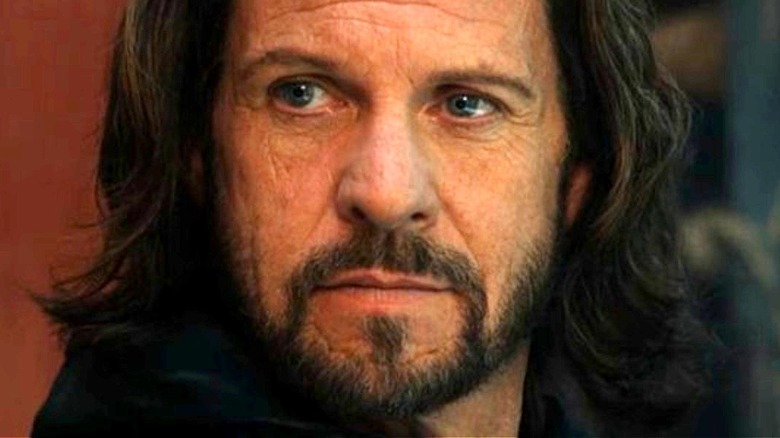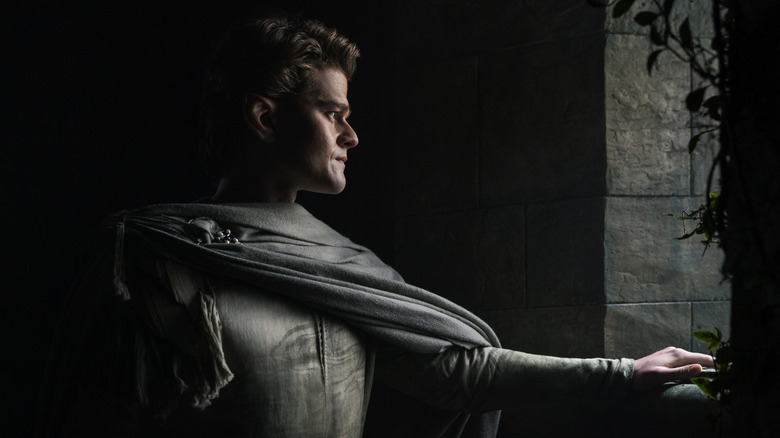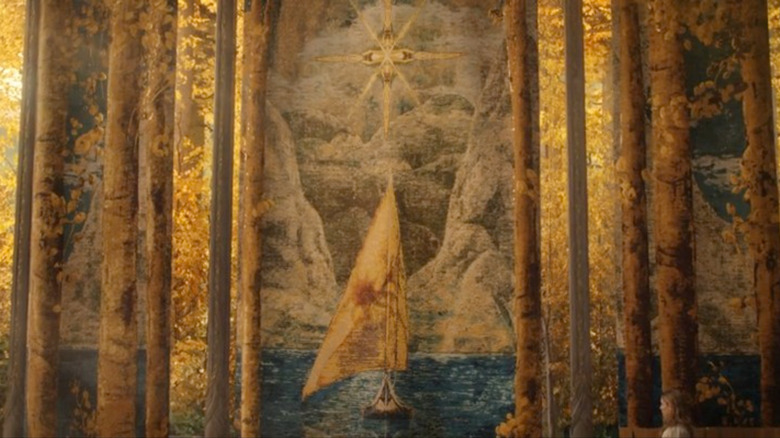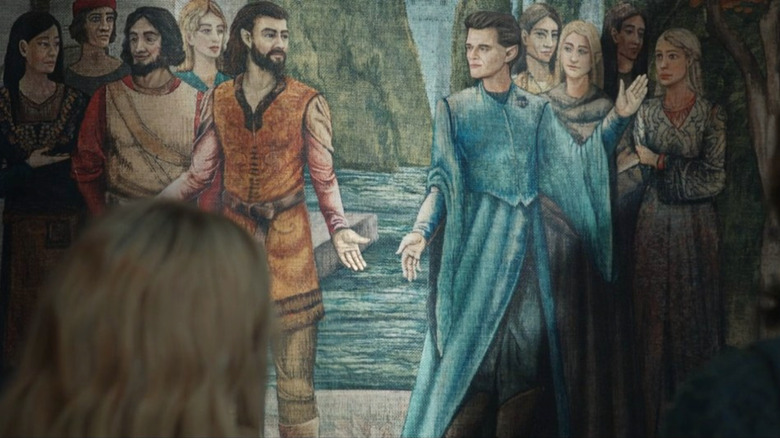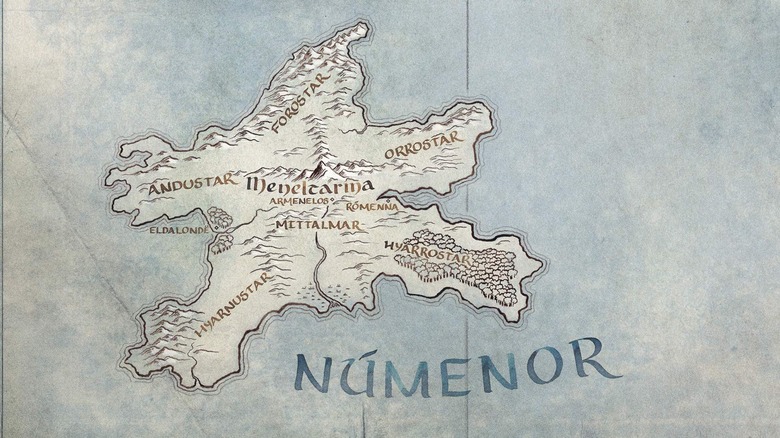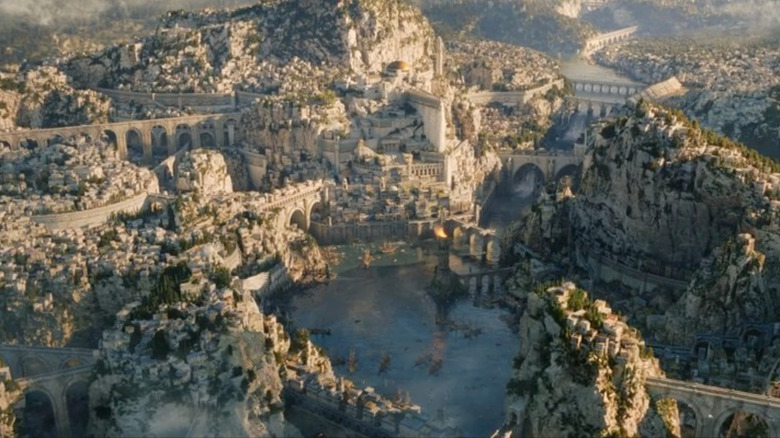Who Is Elros On The Lord Of The Rings: The Rings Of Power?
The third episode of "The Lord of the Rings: The Rings of Power" introduces audiences to the awe-inspiring island nation of Númenor. The kingdom set in the midst of the sea is at the height of its glory, reflecting a rise to power that plays out over centuries of time in the source material, and it all starts with one man: Elros.
When Galadriel and Elendil ride to the western side of the island to visit the Hall of Lore during the third episode, the Elf is clearly impressed by the fact that Elros himself founded the ancient library. Elendil asks if Galadriel knew him, to which she responds that he was "an uncommon spirit." The pair pause to look at a Byzantine-style tapestry that depicts Elrond and Elros looking at each other with a group of Elves and Humans behind them, respectively. From there, the conversation moves on to other matters like the state of the current king and the mysterious meaning of Sauron's sigil.
However, the reference to Elros isn't one made up for the show. Nor is it a minor matter. Elros is a huge deal in Middle-earth history for several important reasons. Let's take a quick stroll through the life and times of this hero of Men, to see just how important he is to the entire world of Middle-earth that we all know and love.
Elros has a complicated family history
Elros may end up remembered as a famous King of Men, but his path to mortal royalty isn't a cut-and-dry issue when he's born. He's the son of Eärendil and Elwing, two key heroes who play an essential role in defeating the original Dark Lord Morgoth at the end of the First Age (right before the era when "The Rings of Power" is set). Elros isn't an only child, either. He has a twin brother — a fella named Elrond.
The twins' family tree is utterly and completely unique in Tolkien's legendarium. They're connected to ... like, everybody. Tolkien's famous Man and Elf pairing of Beren and Lúthien is the most recognizable set of these relatives for anyone new to Tolkien's lore. But the role call of Elros's ancestry is much longer than that. It even includes one of the angelic Maiar.
"The Return of the King" summarizes the impressive pedigree of the twin boys by stating that "In them alone the line of the heroic chieftains of the Edain in the First Age was preserved; and after the fall of Gil-galad the lineage of the High-elven Kings was also in Middle-earth only represented by their descendants." "The Silmarillion" adds, "And from these brethren alone has come among Men the blood of the Firstborn and a strain of the spirits divine that were before Arda.
Elros's backstory immediately puts him into the spotlight, and it gives him some street cred, too. But the Man or the Elf — more on that in a minute — isn't a trust fund baby who lives a cushy life while he rides on his family's past success. He goes and makes a name for himself all on his own.
Elros' life gets off to a rough start
When Elros is born, the First Age is at its bleakest point. Morgoth has nearly taken over, and things look pretty bad for the Elves and Edain (the latter are the noble Men of Middle-earth who side with the Elves against evil). To make matters worse, when Elros is still a child, he gets caught up in an Elvish civil war. He and Elrond's parents survive the catastrophe but never return, so their kids are basically orphaned.
Elros and his brother are left in a cave in the woods where they're found by their captors. In fact, this is where Elros gets his name. "The Silmarillion" says Elros means "Star-foam," and in a letter Tolkien wrote to a fan in 1958, the author clarified that the second half of Elros's name means "dew, spray (of fall or fountain)" adding the tragic detail that "The infants were not slain, but left like 'babes in the wood,' in a cave with a fall of water over the entrance. There they were found: Elrond within the cave, and Elros dabbling in the water."
While things start rough for Elros, his captors take pity on the twins and raise them. As they start to grow older, they quickly realize that they have a tough, interesting, and completely unparalleled choice ahead of them.
Elros chooses a mortal life
Elros and Elrond are called the Half-elven or "Peredhil." Not surprisingly this is because they're part Elf and part Man (with a dash of Maiar thrown in for good measure). This means they get to make a unique choice. On the one hand, they can choose to live as mortal Men who are given the gift of death and can leave the world to go on to an unknown doom or destiny. On the other hand, they can live indefinitely as Elves who are bound to the world and tied to its fate.
Everyone knows that Elrond chooses the Elvish option. After all, we still see him puttering around giving wise counsel to Frodo and company thousands of years later. But Elros? "The Return of the King" tells us that "Elros chose to be of Man-kind and remain with the Edain; but a great life-span was granted to him many times that of lesser men."
"The Silmarillion" adds some more details, saying that, "But to Elros, who chose to be a king of Men, still a great span of years was allotted, many times that of the Men of Middle-earth; and all his line, the kings and lords of the royal house, had long life even according to the measure of the Númenóreans." And yes, that means we've reached the point where Elros' fate crosses with that of Númenor.
Elros and the founding of Númenor
When the First Age ends, Morgoth falls, and evil appears to be vanquished. The Elves are given the option to go back to Valinor, away in the west, if they want to, but Men aren't allowed into those immortal lands. So, the Guardians of the World called the Valar give the noble group of Men called the Edain a special gift. "The Silmarillion" says that, "A land was made for the Edain to dwell in, neither part of Middle-earth nor of Valinor, for it was sundered from either by a wide sea; yet it was nearer to Valinor." In "The Return of the King" we also get a summary of the motivation for this gift when it says, "As a reward for their sufferings in the cause against Morgoth, the Valar, the Guardians of the World, granted to the Edain a land to dwell in, removed from the dangers of Middle-earth."
This island is raised from the depths of the seas and turned into a paradise called Andor, the Land of Gift. When it's ready, Elros' papa, Eärendil (who, let's remember, is a star at this point) shines brightly to guide the Edain to the island away over the sea. Even as an absentee father endlessly sailing a ship through the firmament, Eärendil still manages to give some sound parental guidance, and Elros himself, following his dad's starlight, leads everyone out into the ocean blue. The Valar calm the waters and send wind to help them sail to their new home. They first arrive on the shores of the island 32 years into the Second Age, and the history of Númenor is officially off and running.
Elros gives Númenor a stable start
Elros doesn't just lead the Edain to Númenor. He also becomes their first king. He certainly has the pedigree to make that claim, but he ends up bringing more than just a bloodline to the table. He also has the stability that comes with a long (though still mortal) lifespan. By the time Elros becomes the first King of Númenor, he's already 90 years old, and yet, he goes on to rule the blossoming island realm for 410 more years, dying at the ripe old age of 500 years old.
As king, Elros takes on the High-Elven name Tar-Minyatur, which means "high first-ruler," and he ushers his fledgling kingdom from the startup phase into a place of regal power unrivaled in Middle-earth. In fact, the power of Númenor ends up growing so great that, in "The Return of the King," we get this line — "So great was the might and splendour of the Númenóreans that Sauron's own servants deserted him; and Sauron humbled himself, doing homage, and craving pardon."
... but we'll leave the rest of that story for a later season of the show. For now, suffice it to say that Elros gives Númenor a lengthy and stable initial tenure as king. His descendants continue to rule the island and, eventually, some of them branch off and found other kingdoms (including Gondor) on the mainland. The kings of these kingdoms continue to connect back to Elros all the way down to a young buck named Aragorn, who claims the throne of Gondor due to his link to no one less than Elros himself.
"The Rings of Power" premiered in early September. Episodes will continue to air weekly for the remainder of its eight-episode first season.
